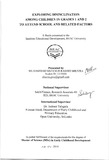| dc.contributor.advisor | Yesmin, Sakila | |
| dc.contributor.advisor | Talagala, Dr. Indrani | |
| dc.contributor.author | Shuvra, Muhammad Mizanur Rashid | |
| dc.date.accessioned | 2018-03-25T08:57:01Z | |
| dc.date.available | 2018-03-25T08:57:01Z | |
| dc.date.copyright | 2014 | |
| dc.date.issued | 2014-04-30 | |
| dc.identifier.other | ID 12155006 | |
| dc.identifier.uri | http://hdl.handle.net/10361/9739 | |
| dc.description | This thesis is submitted in partial fulfilment of the requirements for the degree of Masters of Science in Early Child Development, 2014. | en_US |
| dc.description | Cataloged from PDF version of thesis. | |
| dc.description | Includes bibliographical references (page 45 - 47). | |
| dc.description.abstract | Academic achievement in a child's life begins formally within school settings. We
expect that children would enjoy school and enthusiastically attend school regularly.
Several studies have emphasized the importance of class environment and teachers'
significant role in motivating students through nurturing their interest. Important
aspects of such motivation include, teacher's pedagogic skills, capacity to manage
children and amicable social environment in the class. Lack of these features are
likely to create disinclination among children to attend school regularly.
The general objective of this study was to explore the reasons that instigate and
promote disinclination in children of grade 1 and grade 2 towards attending school.
The study was a sequential mixed method study (QUAN-qual). Sixty parents of
children attending two schools in Mohammadpur, Dhaka were given self administered
questionnaires randomly found waiting on the streets for their children after obtaining
their written consent. Data from this questionnaire helped identify disinclined children
for informal interviews through purposive sampling. Four parents consented for
indepth interview and seven parents gave assent for informally interviewing their
children. Data were analyzed in STATA.
Findings revealed that 45Yo (n:27) of all the parents interviewed (N : 60) have
divulged that children expressed disinclination to go to school regularly, of which at
least a quarter of them refuses to go to school every day . Reasons children mentioned
included uninteresting class work, less playing space, less playing time, unfriendly
teachers and unfriendly peers. Majority of parents, mentioned lack of play space as a
more important factor for creating disinclination to attend school in children
compared to lack of play time. While bivariate Fischer's exact test showed the latter
four factors associated with children's more frequent expression of disinclination, multivariate logistic regression showed lack of playtime as the only statistically
significant predictor for a child's everyday disinclination to attend school. Lack of
space for playing was a marginally significant factor. Informal discussion (qualitative
method) with children was consistent with quantitative conclusions about lack of
playing opportunity contributing to disinclination. Parents added excessive workload
(as a barrier to play time) as another factor with this. It was interesting to find that
some parents strongly believe lack of sleep in the morning makes a child disinclined
to go to school.
The study found children and parents of two non govemment schools in Dhaka report
lack of play time and space as the most important factors that contribute to their
disinclination to attend school. School's curricula allow minimum time for children to
stay in school and, therefore, less playing time and quality teacher-student interaction
time.
This study has been able to explore factors that make children disinclined to attend
school consistent with the reality of the school's context in urban Dhaka. Further study
with larger sample size is required to ensure a wider generalizability of these findings
and improving the situation through targeted programmatic approach. | en_US |
| dc.description.statementofresponsibility | Muhammad Mizanur Rashid Shuvra | |
| dc.format.extent | 53 pages | |
| dc.language.iso | en | en_US |
| dc.publisher | BRAC Univeristy | en_US |
| dc.rights | BRAC University thesis reports are protected by copyright. They may be viewed from this source for any purpose, but reproduction or distribution in any format is prohibited without written permission. | |
| dc.title | Exploring disinclination among children in grades 1 and 2 to attend school and relatbd factors | en_US |
| dc.type | Thesis | en_US |
| dc.contributor.department | Institute of Education Development, BRAC University | |
| dc.description.degree | M. Early Child Development | |

